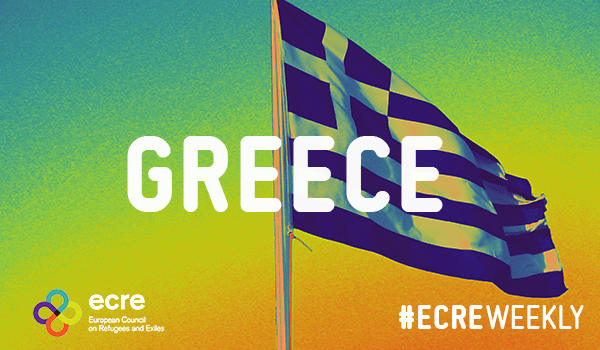At least three boats arrived to Lesvos between 19 and 21 of January with one death reported. The situation in camps across Greece is further deteriorating as snow sets in and temperatures dropping close to zero.
The Greek coast guard rescued 24 people, on 19 January when a boat believed to have taken off from Turkey reached a rocky area in the southeastern part of Lesvos. Additionally, one dead body was recovered and 3 people who had jumped into the water before the boat reached the coast have reportedly been found alive and well. Another landing of a boat on Lesvos, east of Eftalou, carrying seven people including a child was reported by the Aegean Boat Report in the evening of 19 January. The group went into hiding in fear of being deported but have been instructed by the organisation on how to reach the quarantine camp in Megala Therma. In the early hours of 21 January, a boat arrived directly at the beach in front of the so-called Moria 2.0 camp in Kara Tepe. Reports differ but somewhere between 10 and 70 people were on-board.
The winter has set in on the Aegean islands as well as the mainland and the situation for asylum seekers and refugees in camps across Greece is rapidly deteriorating. In the ‘new Malakasa’ construction north of Athens funded by EU, 782 people including 258 children are freezing in tents covered with snow. Water and power cuts in the refugee reception and identification center VIAL on Chios over the weekend left people unable to cook and covered only by blankets and sleeping bags in their tents in the freezing cold. The so-called Moria 2.0 in Kara Tepe hosting some 7,500 people that has already seen several floodings and storms ravaging the camp also experienced recent power cuts. On 20 January a fire erupted in the camp as the result of an electricity problem causing no injuries but burning down a tent.
The European Court of Human Rights has directed a series of questions to the Greek government related to eight cases of particularly vulnerable people residing in the so-called hotspots in Chios, Kos, Lesvos and Samos. According to a press release from HIAS Greece and Equal Rights Beyond Borders, the cases: “demonstrate the structural illegality and impossibility to implement the hotspot approach and border procedures in a way that does not violate human rights. This should also be taken into consideration by decision-makers in the EU, as the proposal on the ‘New Pact on Migration and Asylum’ puts a focus on precisely these border procedures and the externalisation of the responsibility for refugee protection that led to the given situation.
During a plenary session on 19 January entitled ‘Council and Commission statements – Humanitarian situation of refugees and migrants at the EU’s external borders’ numerous MEPs expressed their dismay with the current situation in Greece and urged action from the Council and Commission.
For further information:
- ECRE, Greece: Significant Decrease of Arrivals – Chaos Continues, January 2021
- ECRE, Greece: Deaths and Push-backs Continue, Racist Attack on Hosting Centre for Unaccompanied Children, Camp Conditions Deteriorating, January 2021
- ECRE, Greece: Authorities Block Scrutiny of Camp Conditions, Lead Poisoning adds to Risks in Moria 2.0, Concern over Remote Interviews, December 2020
- ECRE, Greece: Migration Minister Praises Conditions in Moria 2.0, Pushbacks and Shipwrecks Continue, December 2020
- ECRE, Greece: Frontex Denies Involvement in Pushbacks, Expert Council Critique of NGO Registration Rules, November 2020
- ECRE, Greece: EU to Finance Camps on Islands, CPT Calls for Reforms of Detention System and end of Pushbacks, Whereabouts of Rejected Asylum Seekers Unknown, November 2020
- ECRE, Greece: Father of Drowned Child Arrested, Thousands of Pushbacks Documented, Frontex Involvement in Pushbacks Under Scrutiny, November 2020
- Joint statement, Turning rhetoric into reality: New monitoring mechanism at European borders should ensure fundamental rights and accountability, November 2020
- ECRE, Greece: Well-run PIKPA Camp Evicted while Situation on Islands and Mainland Continue to Deteriorate, November 2020
- ECRE, Frontex: Commission Calls for Urgent Meeting over Complicity in Pushbacks, Critique of 100 Million Euro Investment in Drone Surveillance, October 2020
- ECRE, Greece: PIKPA Eviction Postponed, Shortages in New Lesvos Camp, COVID Outbreak Continues, New Pushback Incidents, Golden Dawn Leadership Straight to Jail, October 2020
- ECRE, Greece: Golden Dawn Declared Criminal Organisation, People Return from Mainland to Lesvos, Push-backs Continue, October 2020
- ECRE, Greece: Closure of Accommodation for Vulnerable Amid Deteriorating Conditions in Camps, Transfers to Mainland, October 2020
- ECRE, Greece: New Camp Filling Up, Conditions are Harsh and COVID on the Rise, September 2020
- ECRE, Greece: Transfers to Improvised Tent Camp has Begun, Thousands Sleeping Rough, EU to Co-manage New Reception Structure in Lesbos, September 2020
- Greek Council for Refugees (GCR), Solidarity Now and others: Joint statement of 48 NGOs regarding the fire at the Registration and Identification Centre at Moria, September 2020
- ECRE, Greece: Moria Fire – Thousands Sleeping Rough, Chaos Prevails, Calls for Structural Solutions, September 2020
- ECRE, Greece: 10,000 People Prevented Access, Lockdown Extended, Recognition Rate Increases, September 2020
- ECRE, Greece: Border Fence Extension, Denial of Push-backs, Anti-migrant Violence, Continued Destitution, Drop in Protection Rate, August 2020
- ECRE, Greece: No Accountability for Deadly Shooting, Continued Push-backs and Evictions, Critique of Crack-down on NGOs, German States Willing to Relocate, July 2020
- ECRE, Greece: Camp Lockdown Extended, Children in Detention, Cuts in Housing, Red-tape on NGOs and Continued Push-backs, June 2020
- AIDA, 2019 Update Greece, June 2020
- ECRE, Greece: Pushbacks Continue, Eviction of Makeshift Camp in Athens, June 2020
- ECRE, Greece: 500 to Escape Greece – Thousands Facing Destitution, Detention and Push-backs, June 2020
Photo: ECRE
This article appeared in the ECRE Weekly Bulletin. You can subscribe to the Weekly Bulletin here.

